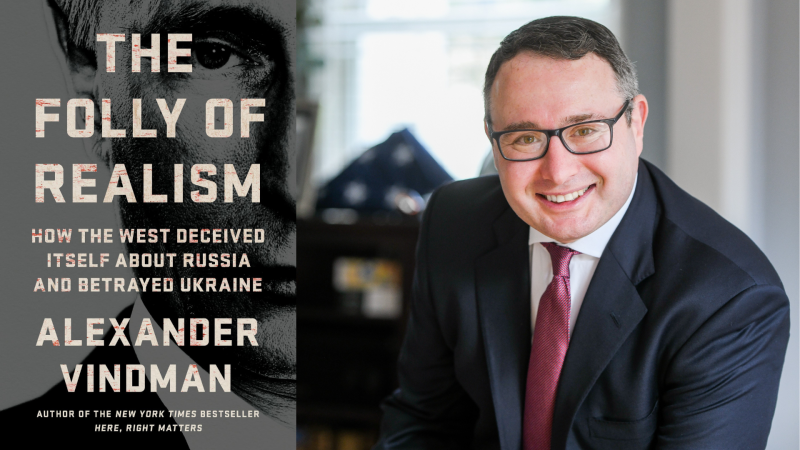The United States has reached a preliminary deal with Ukraine to share in revenue from the country’s mineral assets, but so far it is not offering security guarantees against Russia in return. It’s a reflection of the Trump Administration’s Russia-first policy, according to retired army lieutenant colonel and Trump impeachment whistleblower Alexander Vindman. We talk to Vindman about his new book “The Folly of Realism: How the West Deceived Itself About Russia and Betrayed Ukraine.”
Trump Whistleblower Alexander Vindman on Why the U.S. Has Turned Its Back on Ukraine

Guests:
Alexander Vindman, author, His new book is "The Folly of Realism: How the West Deceived Itself About Russia and Betrayed Ukraine"; lieutenant colonel, United States Army (Retired); former director for European Affairs; U.S. National Security Council
Show Highlights
Trump’s Stance on Ukraine and Russia
Retired Army Lieutenant Colonel Alexander Vindman, known for his role as a whistleblower in Trump’s first impeachment, finds it shocking that the United States recently voted against a United Nations resolution condemning Russia’s invasion of Ukraine. Vindman describes it as a “sharp break in policy” and a “180-degree reversal.” He thinks that Trump’s approach sides with Russia against U.S. allies, signaling that the U.S. is “unreliable” and “dangerous” to its allies.
Vindman says that Trump has a proclivity for strongmen, a fondness for Putin, and an antipathy to Zelensky. He sees this stemming from the 2019 impeachment inquiry, where Trump tried to pressure Zelensky into investigating Joe Biden. Vindman also says Trump “flat-out lies” about matters like Zelensky’s approval rating.
The Folly of Realism in US Foreign Policy
In his new book, Vindman criticizes the “folly of realism” in U.S. foreign policy, which he thinks, when it comes to Russia, has led to a pattern of appeasement and misguided hopes over the past 30 years. He advocates for a “neo-idealist” approach, prioritizing values and partnerships with democracies to drive economic growth and security.
“We’ve been wrong so much in this very conciliatory approach, succumbing to hopes and fears, putting Russia first, that, really, it’s more pragmatic than ideological that we rebalance the scales,” Vindman says. Focusing solely on short-term transactional interests has been detrimental, and a more long-sighted value-driven approach is needed.
The Proposed Minerals Deal with Ukraine
Regarding the proposed deal for the U.S. to share in revenue from Ukraine’s mineral resources, Vindman expresses cautious optimism. He calls it “mutually beneficial” and a potential “win-win” for both countries. He also sees it as a way to keep Trump interested in Ukraine by providing an “interest tether.”
“The U.S. needs those commodities—needs those metals. Ukraine has very massive stockpiles [of titanium].The U.S. still relies on Russia for some titanium, an adversary,” Vindman says.
However, Vindman acknowledges the volatility of the Trump administration. He notes: “The way the agreement is written is, if the U.S. doesn’t keep its side of the bargain, then Ukrainians won’t keep their side of the bargain.”
Security Guarantees and NATO’s Role
The proposed deal includes security guarantees for Ukraine, but Vindman believes this is a “high bar” and that Europe will need to take a more active role in Ukraine’s security.
He is concerned about the potential erosion of NATO without U.S. leadership. “It’s an enormous loss if the U.S. is no longer the backbone of NATO,” he says. “The U.S. has provided a disproportionate contribution to NATO and European security.”
Signaling weakness could lead European allies to consider deploying troops to Ukraine without U.S. support, risking escalation with Russia. Vindman argues that while challenging, bringing Ukraine into NATO may be the only way to prevent Russian aggression in the long term, as Russia is “deeply afraid” of confronting the U.S. and NATO military.
Risks and Concerns Surrounding Trump’s Approach
Trump’s “Russia-first policy” is a repetition of past mistakes that could prolong the war in Ukraine, Vindman says. The war, and Trump’s mismanagement of it, creates a “dangerous mix.” Vindman sees it stretching into 2026. But he says that if Ukraine achieves a ceasefire and Russia absorbs a loss, it could provide hope for other countries in the region, including Belarus.
Vindman’s Personal Experience and Perspective
Throughout the conversation, Vindman draws upon his experience serving in the White House under Trump and acting as the key whistleblower in his impeachment. He expresses deep disappointment in the widespread erosion of democratic norms and institutions under Trump’s leadership. “We’re all under assault — the democracy and the institutions that undergird democracy are under assault,” he says.
Despite the challenges, Vindman remains committed to his oath to defend the Constitution. “Just because I was forced to retire doesn’t mean that I’ve given up on my oath and obligations,” he says. “So I’m gonna continue to serve.” Vindman responds to a caller’s question about him feeling safe, acknowledging the potential dangers but resolving, “I will not shirk from my responsibilities to stand up for what I think is right.”
This content was edited by the Forum production team but was generated with the help of AI.